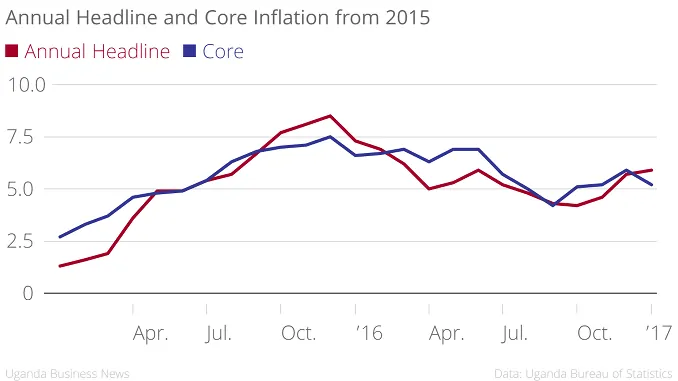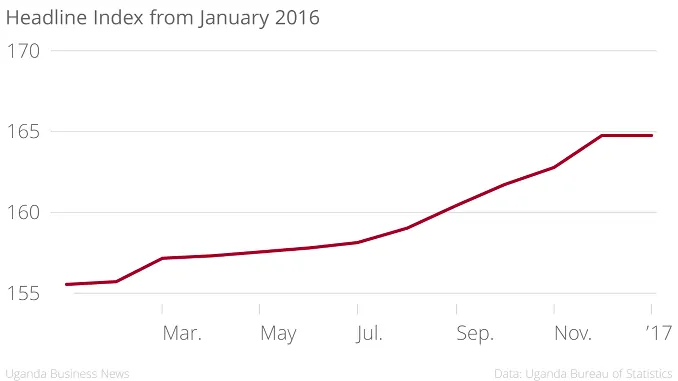Inflation rose to 5.9% in January, the highest rate in seven months, mainly driven by an increase in the price of food crops, according to the Uganda National Bureau of Statistics. Headline inflation in December 2016 came in at 5.7%.
Annual food crops inflation increased to 14.5% for the year ending January 2017 compared to the 10.8% recorded last month. The acceleration was mainly due to a rise in fruits inflation to 30.4% versus 24.8% in December, and vegetable inflation to 6.8% from 2.4% last month.
However core inflation, which strips out the volatile food and energy prices, fell to 5.2% for the year ended January 2017 from 5.9% last month. The measure will come into focus when Bank of Uganda’s monetary policy committee meets to set its policy lending rate on 15 February.
The central bank cut the rate by 100 basis points in December 2016 to 12% despite back-to-back rises in core inflation – in October and November – citing the need to “keep the domestic economic growth momentum.”
A statement by the bank’s governor explaining the decision said the BoU expected inflation to increase in the short term due to a rise in the prices of food and fuel prices, but that core inflation would settle around the medium-term target of 5% over the next 12 months.
Read More: Bank of Uganda cuts benchmark interest rate to 12%
The annual energy, fuels, and utilities inflation rose to 1.4% in January compared to -2.8% in December, mainly due to a rise in electricity inflation to 6.7% from -6.2% in the previous month. Solid fuels also rose to 2.4% in the year ended January 2017 versus 0.1% in the year ended December.
The consumer price index, which measures the average change over time in the prices of a basket of consumer goods and services, and whose rate of change determines annual headline inflation, stayed flat at 164.76 in January. The core inflation index however declined to 160.79 from 160.92 in December 2016.
The Arua geographical area registered the highest annual inflation of 7.9% versus 8.5% in December, on the back of housing, water, electricity, gas, and other fuels inflation which rose to 8.6% in January compared to -0.5 the previous month. Kampala High Income registered the second highest inflation of 6.7% versus 7.0% in December, while Fort Portal had the third highest rate of 6.6% versus 7.4% in December.
Monthly headline inflation stayed at 1.2%, the same rate registered in December 2016. Core inflation during the month fell to -0.1% from the 1.2% registered last month. Food crop prices also fell to -1.6% compared to the 1.0% recorded in December. EFU inflation was the only accelerator, rising to 3.2% from 1.4% last month.








